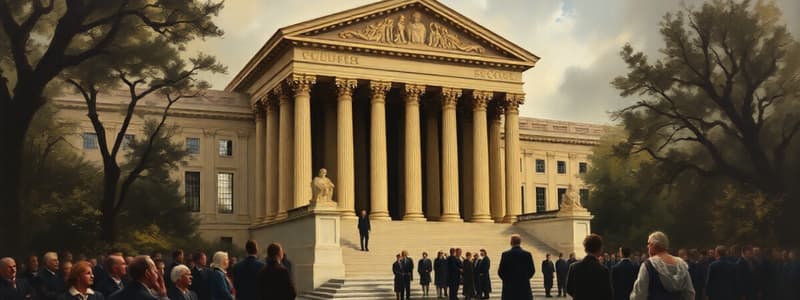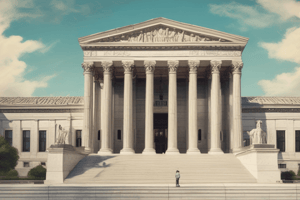Podcast
Questions and Answers
Who represents the United States in cases before the Supreme Court?
Who represents the United States in cases before the Supreme Court?
What does the 'rule of _____' require for a case to be heard by the Supreme Court?
What does the 'rule of _____' require for a case to be heard by the Supreme Court?
What do Supreme Court hearings focus on rather than direct ______ of evidence?
What do Supreme Court hearings focus on rather than direct ______ of evidence?
During the oral argument phase, what do each side present to the justices?
During the oral argument phase, what do each side present to the justices?
Signup and view all the answers
Once the Supreme Court rules on a case, the ruling is enforced by which branch of government?
Once the Supreme Court rules on a case, the ruling is enforced by which branch of government?
Signup and view all the answers
Judicial _____ refers to justices who believe in limiting the powers of the courts.
Judicial _____ refers to justices who believe in limiting the powers of the courts.
Signup and view all the answers
What can sway the Supreme Court's actions by causing justices to consider public opinion?
What can sway the Supreme Court's actions by causing justices to consider public opinion?
Signup and view all the answers
The concept of the 'living' constitution suggests it should be interpreted in the context of which type of changes?
The concept of the 'living' constitution suggests it should be interpreted in the context of which type of changes?
Signup and view all the answers
What is the primary focus of Supreme Court hearings compared to typical trial courts?
What is the primary focus of Supreme Court hearings compared to typical trial courts?
Signup and view all the answers
Which term describes justices who emphasize the need for the courts to actively interpret the Constitution?
Which term describes justices who emphasize the need for the courts to actively interpret the Constitution?
Signup and view all the answers
What is the primary function of the U.S. Court of Appeals?
What is the primary function of the U.S. Court of Appeals?
Signup and view all the answers
Which of the following courts is an example of a legislative court?
Which of the following courts is an example of a legislative court?
Signup and view all the answers
What is the highest court to which a case can be ultimately appealed?
What is the highest court to which a case can be ultimately appealed?
Signup and view all the answers
What is the first step in the process of appealing to the U.S. Supreme Court?
What is the first step in the process of appealing to the U.S. Supreme Court?
Signup and view all the answers
Which type of jurisdiction allows a case to be heard in more than one type of court?
Which type of jurisdiction allows a case to be heard in more than one type of court?
Signup and view all the answers
What distinguishes civil law from criminal law?
What distinguishes civil law from criminal law?
Signup and view all the answers
What is original jurisdiction in the context of court systems?
What is original jurisdiction in the context of court systems?
Signup and view all the answers
What establishes the authority of Congress to create Inferior Courts?
What establishes the authority of Congress to create Inferior Courts?
Signup and view all the answers
For how long are judges of Constitutional Courts appointed?
For how long are judges of Constitutional Courts appointed?
Signup and view all the answers
What is one of the responsibilities of U.S. Attorneys?
What is one of the responsibilities of U.S. Attorneys?
Signup and view all the answers
Study Notes
U.S. Court System - Key Functions and Processes
- Primary function of U.S. Court of Appeals: To review decisions of lower courts, ensuring legal errors are corrected.
- Example of a legislative court: Not specified in the provided text.
- Highest court for appeal: U.S. Supreme Court.
- First step in Supreme Court appeal: Petitioning the Supreme Court for a writ of certiorari.
- Courts established by Article III: Constitutional courts.
- Supreme Court case selection criteria: Significance, conflict among lower courts, and importance.
- Appellate court's ruling on error: If no error is found, the lower court decision stands.
- Purpose of criminal law: To punish those who violate criminal statutes and maintain social order.
- Jurisdiction type allowing cases in multiple courts: Concurrent jurisdiction.
- Court reviewing lower court decisions: Appellate court.
- Distinguishing civil and criminal law: Civil law deals with private disputes; criminal law involves violations of public law.
- Highest court in U.S. judicial system: U.S. Supreme Court.
- Court type conducting trials: Trial courts.
- Original jurisdiction: Power of a court to hear a case for the first time.
- Court between trial and highest state court: Court of Appeals.
- Jurisdiction authorizing sole authority: Exclusive jurisdiction.
- Case NOT heard by Judicial Branch: Private property disputes (unless federal law applies.)
- Authority source for Inferior Courts: Article III of the Constitution.
- Primary role of Constitutional Courts: To interpret and apply the Constitution and federal laws.
- Judge removal process (Constitutional Courts): Impeachment by Congress.
- U.S. Court of Federal Claims function: To hear claims against the U.S. government.
- Correct statement about Courts of Appeals: They review district court decisions and are part of the federal court system.
- U.S. Court of Appeals for Veteran Claims distinction: Specialized court established to hear appeals involving veteran benefits.
- Legislative/Special Courts: Established by Congress to address specific areas or functions; military commissions, court of federal claims, court of international trade are examples.
- Military Commission Accuracy: Statements regarding military commissions provided.
- Federal court judge nomination: By the President.
- Constitutional Court judge appointment length: Life tenure, unless impeached.
- U.S. Attorney responsibilities: Representing the U.S. government in federal court.
- Judicial Restraint vs. Judicial Activism: Judicial restraint emphasizes limited court interpretation of laws while judicial activism allows broader interpretation.
- Body confirming judges: Senate.
- U.S. Marshals term: Varies depending on their position and employment status; life tenure for appointment as a Circuit Judge, however.
- Not a U.S. Marshals responsibility: Arguing a case in court.
- Judicial Activism definition: A judicial philosophy that actively interprets the Constitution and law in light of modern circumstances.
- Congress's role in Federal judges' compensation: Sets the salary.
- Role of judge in jury trial: Guiding the jury through the trial process and law explanation.
Supreme Court Case Selection and Procedures
- Criteria for Supreme Court Case Selection: Significance, conflict among lower courts, and potential for setting legal precedent.
- Writ for Supreme Court Review: Writ of certiorari.
- U.S. Supreme Court case representation: Solicitor General.
- Rule for Supreme Court Case Hearing: Rule of four, requiring four justices to agree on a case.
- Supreme Court Trial Distinction: Focused on legal questions and not evidence presentation.
- Oral Argument Function: Presentation of legal arguments to justices.
- Enforcing Supreme Court Decisions: Executive branch.
- Judicial Philosophy Advocating Limited Court Power: Judicial restraint.
- Possible Influence on Supreme Court Decisions: Public opinion, influencing justices.
- Living Constitution Concept: The idea that the Constitution should adapt to changing circumstances and social needs.
Studying That Suits You
Use AI to generate personalized quizzes and flashcards to suit your learning preferences.
Description
Test your knowledge about the U.S. Court System, focusing on the key functions and processes within it. This quiz covers the roles of appellate courts, the significance of the U.S. Supreme Court, and the distinctions between civil and criminal law. Prepare to understand the judiciary's structure and its decision-making criteria.



